Looking to download videos from Facebook, including private or restricted content? While downloading standard videos from websites can be straightforward, saving private Facebook videos requires specialized tools. Many Chrome extensions claim to download Facebook videos, but often fail to work with private or restricted content.
In this guide, you’ll discover 4 reliable solutions, we’ll cut through the noise and show you exactly how to save private Facebook videos – let’s begin.
Can You Legally Download Private Facebook Videos?
➊ Your Own Content:
Yes, downloading your own private videos from Facebook is permitted since you hold the rights to this content.
➋ Others’ Private Videos:
Downloading private videos posted by others without explicit permission:
- Violates Facebook’s Terms of Service
- May constitute copyright infringement
- Could breach privacy laws
➌ Permitted Exceptions:
Downloading is only acceptable if:
- The content owner shared it directly with you (or your group)
- They explicitly granted download permission
- You use the content strictly as authorized
⚖️ Core Principle: Always respect creators’ rights. Downloads should be limited to legally authorized personal use.
Legal Disclaimer
This tool is provided for educational and personal use only. You acknowledge that downloading videos, especially private content, may violate Facebook’s Terms of Service and copyright laws. You are solely responsible for ensuring you have the necessary permissions from the content owner. The provider assumes no liability for any misuse or resulting consequences.
Solution 1. Download Private Facebook Videos via Video Downloader
Tired of limited browser extensions? A dedicated desktop video downloader offers the versatility and reliability you need. For a seamless experience across public and private content, we recommend Wittytool Video Downloader.
📌 The Ultimate Solution For:
→ Downloading videos (public/private) from Facebook, YouTube, Instagram, Telegram and 1000+ sites
→ Preserving 4K/HD quality
→ Batch-processing multiple links
→ Converting videos to MP3
→ Saving live streams & video thumbnails
✨ Key Advantages of Wittytool Video Downloader
| Feature | Capability |
|---|---|
| Platform Support | Facebook, Instagram, YouTube, Twitter, TikTok, Twitch + 1000+ sites |
| Private Content | Downloads access-restricted videos when you have permissions |
| Quality Options | Save in 8K/4K/1080p/720p/480p resolutions |
| Batch Processing | Download entire playlists/link groups simultaneously |
| Format Conversion | Extract audio as MP3 with one click |
| Advanced Capture | Download live streams & save video thumbnails |
Step 1: Input URL
Enter the target webpage URL into the URL field and click Open URL to load the content. Alternatively, use the Paste URL button for direct clipboard insertion.
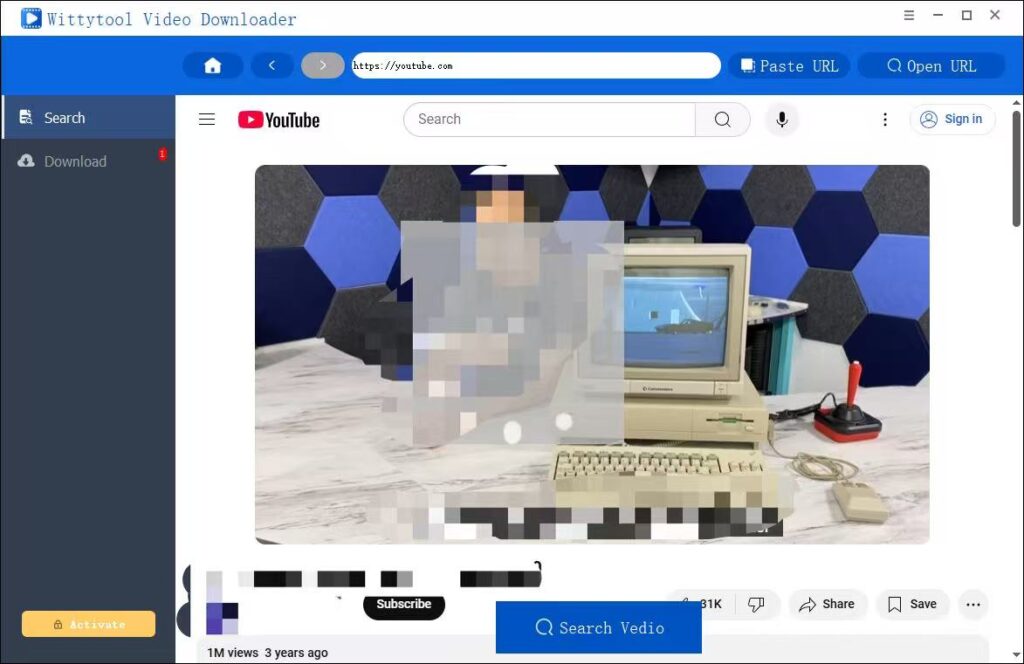
Step 2: Select Media Format
Click Search Video to activate media detection. Choose Video (with visual and audio) or Audio (audio-only format), specify the save directory, and confirm by clicking Download.
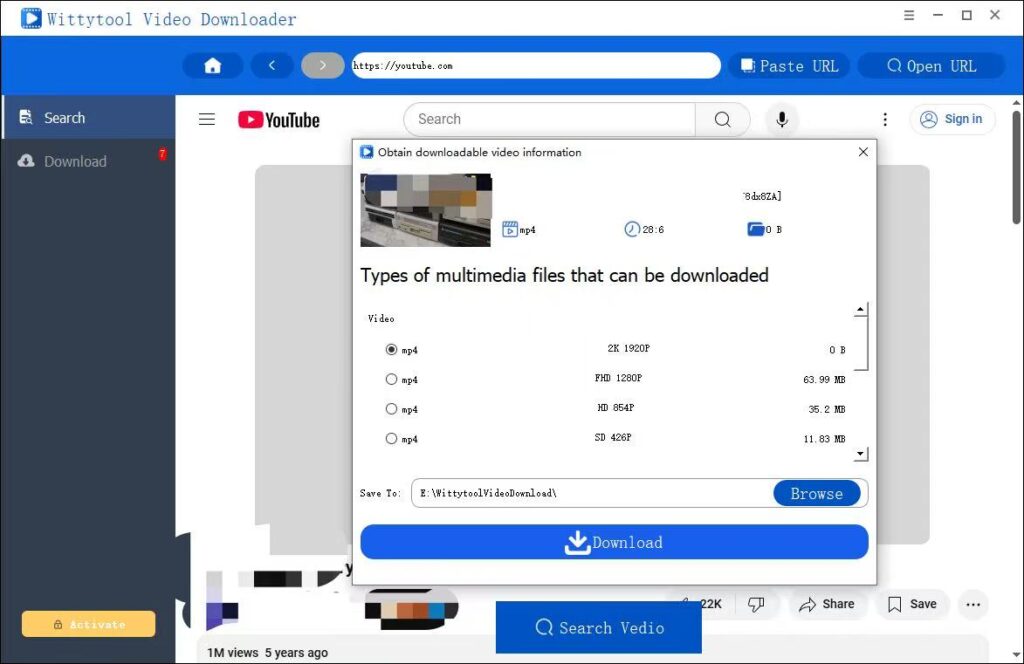
Step 3: Verify Completion
Upon successful download, navigate to the Finished tab to access your file. Verify metadata (e.g., format, size) as needed.
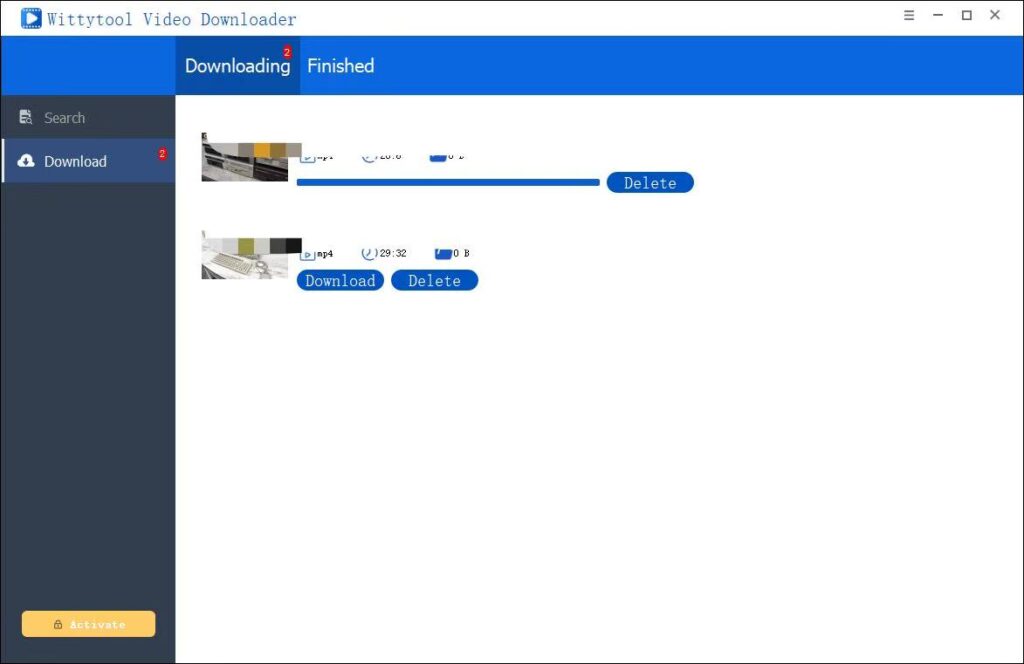
Solution 2. Download Private Facebook Videos via FDownloader (Web-Based Solution)
FDownloader is a browser-friendly tool that supports how to download Facebook videos that are private. Simply paste the video URL, select quality (HD/SD), and download. Key features include:
- No software installation required.
- Works on private videos shared via direct links.
- Encrypted processing to protect privacy.
Steps:
- Copy the private video’s URL from Facebook.
- Visit FDownloader’s website and paste the link.
- Choose resolution and click “Download.”
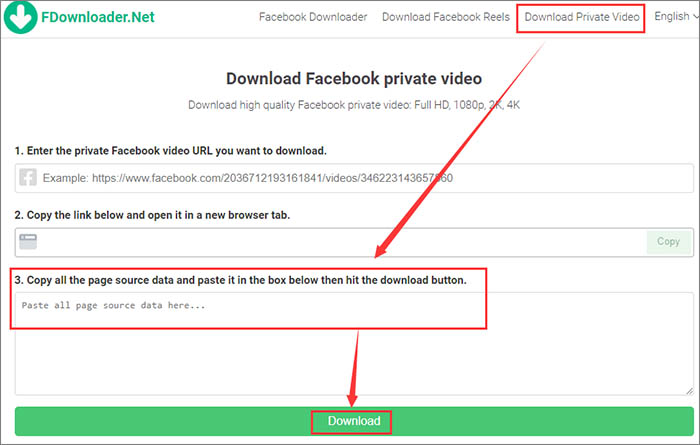
Solution 3. Download Private Facebook Videos via Vidsaver (Multi-Platform Support)
Vidsaver supports Facebook, Instagram, and even YouTube unblocked websites. It detects video sources automatically, making it ideal for private videos embedded in posts or Stories.
- Batch downloading for multiple videos.
- Built-in browser to navigate private profiles.
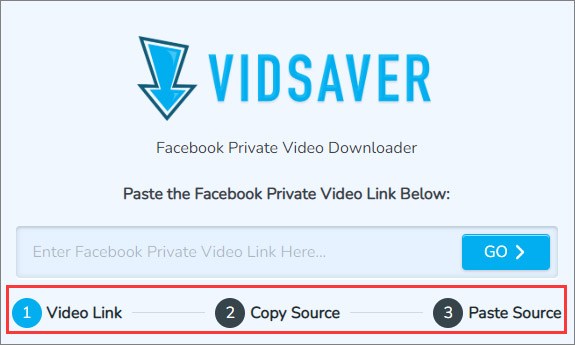
Solution 4. Download Private Facebook Videos via FSave (Chrome Extension)
FSave adds a “Download” button directly to Facebook’s interface. It’s ideal for how to download the video in Facebook without leaving the platform:
- One-click saving for public and private videos.
- No ads or data tracking.
Tip: Always verify permissions before downloading private content to avoid violating privacy laws.

Conclusion
Whether you use web tools like FDownloader or desktop software like Wittytool, downloading videos from Facebook requires balancing convenience with legality. Always respect creators’ rights and use these methods for personal archives only.
FAQ
How do you view your private videos on Facebook?
To view your own private videos on Facebook, you simply need to access them from your profile where they are stored. Since you are the owner, you have permission to view them. Here’s how:
- Log in to your Facebook account.
- Go to your profile by clicking on your name in the top-right corner of the screen.
- Navigate to the ”Photos” section on your profile.
- Click on the ”Albums” tab.
- Find and select the album named ”Your Videos” or ”Private Videos” (the exact name may vary). Alternatively, you can also find your videos by clicking on the “…” (more) button under your cover photo and selecting ”Videos” from the menu.
- All videos you have uploaded will be listed here. You can click on any video to play and view it.
Remember, “private” means the video’s audience is restricted (e.g., “Only Me,” “Friends,” “Custom list”). As the video’s owner, you will always be able to see and view it regardless of the privacy setting.
What’s the simplest method to download Facebook videos?
From my perspective, Chrome extensions serve as an excellent solution for downloading Facebook videos. Among available options, I particularly recommend three browser-based tools: Video Downloader for FB, Video Downloader Plus, and Video Downloader Pro. For users seeking more robust functionality, I would suggest considering Wittytool Video Downloader as a reliable desktop application alternative. This software solution offers enhanced capabilities for those preferring a desktop-based video downloading experience.
For live videos, screen recording during the stream or waiting for the video to be archived post-stream is recommended.
Is downloading videos from the internet legal?
Legality depends on:
- Copyright status: Downloading copyrighted content without explicit permission violates intellectual property laws.
- Permitted: Videos marked as public domain, Creative Commons-licensed, or with creator consent.
- Prohibited: Unauthorized downloads of protected content (e.g., most YouTube/Facebook videos).
- Jurisdiction: Laws vary by country, but platforms like YouTube explicitly prohibit downloads in their terms of service.
Always verify licensing or use official download options (e.g., Facebook’s built-in “Save Video” for personal content).
Does every YouTube video have copyright protection?
- Default protection: By law, all original content uploaded to YouTube is automatically copyrighted to the creator.
- Exceptions: Public domain/Creative Commons: Videos explicitly marked for free reuse; Fair use: Limited use for criticism, education, or commentary, though this is context-dependent and legally nuanced.
YouTube’s Content ID system enforces copyright by scanning uploads against a database of registered works. Unauthorized use may result in penalties like demonetization or account termination.

